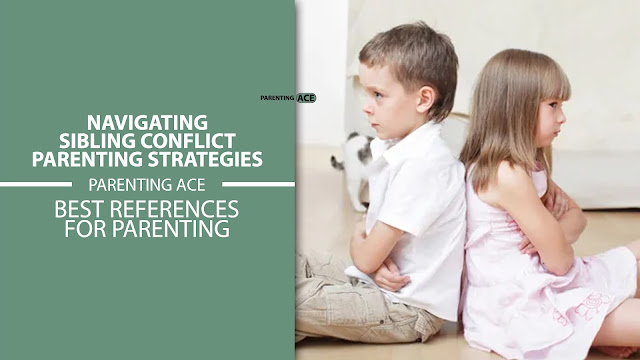How Parents Navigate Sibling Conflict: Strategies for Harmony and Growth
Sibling rivalry, squabbles over toys, and heated disagreements are familiar scenes in many households. Yet, within the complexity of sibling relationships lies a wealth of opportunities for growth, empathy, and connection. In this blog post, we delve into the delicate art of handling sibling conflicts, exploring the dynamics at play and offering practical strategies for parents to foster harmony and understanding among their children. Join us as we unravel the complexities of sibling dynamics and empower parents to navigate conflicts with grace and resilience.
 |
| Navigating Sibling Conflict: Parenting Strategies |
How Do Parents Handle Conflicts Between Siblings?
Sibling relationships are among the most complex and enduring bonds individuals experience in their lives. While siblings can provide companionship, support, and lifelong friendship, they also navigate conflicts that arise from sharing space, attention, and resources within the family. As parents, managing and resolving these conflicts effectively is crucial for promoting harmony within the family and fostering healthy development in each child. In this article, we delve into the dynamics of sibling conflict, explore the role of parents in mediating these disputes, and provide practical strategies for nurturing positive sibling relationships.
Understanding Sibling Conflict
Sibling conflict is a natural and inevitable aspect of family life. It arises from various factors, including differences in temperament, age, interests, and perceived favoritism from parents. Conflicts can range from minor disagreements over toys or personal space to more significant disputes involving power struggles, jealousy, or resentment. These conflicts, if left unresolved, can escalate and have long-term consequences for sibling relationships and individual well-being.
The Role of Parents
Parents play a pivotal role in managing and mediating conflicts between siblings. How parents respond to these conflicts can significantly influence their resolution and the development of healthy conflict resolution skills in their children. It is essential for parents to approach sibling conflicts with empathy, fairness, and a focus on fostering understanding and cooperation rather than simply imposing their authority.
Strategies for Handling Sibling Conflict
- Establish clear expectations: Set ground rules for respectful communication and behavior within the family, emphasizing the importance of listening to each other and finding mutually acceptable solutions to conflicts.
- Teach conflict resolution skills: Encourage siblings to express their feelings and perspectives calmly and assertively, without resorting to aggression or manipulation. Teach them problem-solving techniques such as compromise, negotiation, and finding win-win solutions.
- Encourage empathy and perspective-taking: Help children develop empathy by encouraging them to consider each other's feelings and perspectives. Encourage older siblings to mentor and support younger siblings, fostering a sense of responsibility and care.
- Provide individual attention: Ensure each child receives adequate attention, recognition, and support from parents, reducing the likelihood of jealousy or rivalry between siblings.
- Model positive behavior: Set a positive example for your children by resolving conflicts calmly, respectfully, and constructively. Demonstrate effective communication skills and a willingness to compromise when resolving disagreements with your partner or other family members.
Sibling conflicts are an inevitable part of family life, but they also present opportunities for growth, learning, and strengthening relationships. By understanding the dynamics of sibling conflict and adopting proactive strategies for handling disputes, parents can promote harmony within the family and empower their children with essential conflict resolution skills. Ultimately, fostering positive sibling relationships lays the foundation for lifelong bonds built on mutual respect, empathy, and support.




